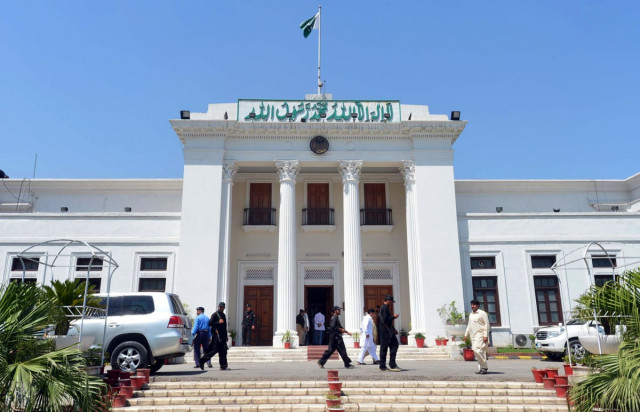Digitisation woes: Assembly struggles with paperless environment
Issues letter to govt depts asking for 150 hard copies along with soft copy

K-P Assembly. PHOTO: AFP
K-P Assembly Secretariat issued a letter to all administrative departments of the government on March 7, asking for 150 printed copies of the documents along with a soft copy in a computer flash drive. This move showed the first sign of the assembly’s dependency on paper.
According to the letter, a copy of which is available with The Express Tribune, the Assembly Secretariat asked departments to send “All assembly business, including questions, bills, motions and other relevant documents on a computer flash drive as soft copy in inpage/Unicode/document/PDF along with only 150 copies for the media and library.”
Senior officials were not happy with directives about 150 hard copies as they said it killed the very spirit of a ‘paperless environment’.
A cover for laziness?
A government employee, requesting anonymity, expressed unease with the letter issued by the assembly secretariat and said, “Why did they spend money on e-governance when they are still asking for 150 copies and a soft copy in flash drive?” He added the departments can send soft copies via email which is more convenient than sending them in flash drives through people. “All we need to do is to send an email and the assembly secretariat can then distribute the information to relevant people and media and also use it to digitise the library.”
The official added the assembly secretariat wants to take off the burden of sending emails to media and also wants to cover its failure for not digitising their library.
Another senior government official, requesting anonymity, said, “The assembly can use its website to upload departments’ responses or legislative business which can then be accessed by everyone including the media.”
He also said, “The K-P Assembly environment cannot be called ‘paperless’ when we are required to send 150 copies.” He added with a project that cost Rs78 million, the assembly reduced ‘paperwork’ by only a 100 copies for the departments.
Buying time and support
The Assembly Information Technology Director Attaullah Khan, when asked about the letter, said the project is in its initial stages and will take two years to complete after which papers will be replaced completely. “The speaker had categorically said the project is in its evolutionary status and will take time to complete.”
He further stated they were only asking for 30 copies from the department initially in the letter, but that was increased due to the assembly’s needs. “We are the seventh parliament in the world to have installed the system so you can imagine how laborious the task will be and the kinds of challenges we are dealing with,” he told The Express Tribune.
Ataullah added the ‘paperless environment’ depends on the response from the Civil Secretariat towards the system. “If they can provide us the legislative business in soft copy through an email we would welcome it,” adding, “We have sent a second letter in which we have provided four email addresses of concerned officials of the assembly.” Ataullah also said the departments take months to reply which delays responses to legislative business.
Regarding media copies, he said they will take up the issue with the speaker and assembly secretary. However, as far as the library was concerned, the assembly will still need a few hard copies to maintain records.
Past practice
According to a government employee, prior to the letter, each department was sending its response on legislative matters to the assembly secretariat with 250 copies each, cased in separate file covers.
“The assembly secretariat sends the legislative matter (question, motion, bill) to the concerned department seeking a response, and we collect data for the matter which our minister then approves, he said explaining the process. “Then we send 250 copies of the reply to the assembly secretariat.”
The backdrop
The K-P Assembly became the first legislative assembly in the country and across South-Asia to computerise legislative business by launching its e-governance system on March 4. Each member of the house got a touch-screen monitor displaying daily agenda of the house in the session, avoiding the need to constantly peruse papers.
K-P Assembly Speaker Asad Qaiser on the occasion had claimed the project will make a ‘paperless environment,’ replacing papers which cost the government heavily.
According to official figures of the K-P Finance department, the government spent Rs77.77 million on stationary up till March 16 in the current finance year (2015-16), while the estimated cost of stationary across the province is Rs188.90 million for the year.
Published in The Express Tribune, March 19th, 2016.













COMMENTS
Comments are moderated and generally will be posted if they are on-topic and not abusive.
For more information, please see our Comments FAQ